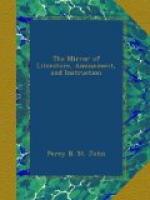traces of the Roman walls of Isurium; their foundations having
been dug up for the mercenary purpose of obtaining their
materials. We cannot sufficiently censure such irreverence to
“hoar antiquity,” or the contracted and grovelling ideas
which actuate such village Vandals.
[4] The following letter was
addressed by Layton, one of the
emissaries
of the Dissolution, to Lord Cromwell, at the
Reformation:—
“Please your worship to understand that the Abbot of Fountaynes hath so greatly dilapidated his house, wasted ye woods, notoriously keeping six ------; and six days before our coming, he committed theft and sacrilege, confessing the same; for at midnight he caused the chapleyne to stele the keys of the secton, and took out a jewel, a cross of gold with stones; one Warren, a goldsmith of the Chepe, was with him in his chamber at the hour, and there they stole out a great emerode with a rubye, the said Warren made the Abbot believe the rubye was a garnet, and so for that he paid nothing for the emerode, but L20. He sold him also plate, without weight or ounces.
“Subscribed,
your poor Priest
and
faithful servant,
R.
LAYTON.”
* * * * *
THE ANECDOTE GALLERY
* * * * *
PALEY.
Paley would employ himself in his Natural Theology, and then gather his peas for dinner, very likely gathering some hint for his work at the same time. He would converse with his classical neighbour, Mr. Yates, or he would reply to his invitation that he could not come, for that he was busy knitting. He would station himself at his garden wall, which overhung the river, and watch the progress of a cast-iron bridge in building, asking questions of the architect, and carefully examining every pin and screw with which it was put together. He would loiter along a river, with his angle-rod, musing upon what he supposed to pass in the mind of a pike when he bit, and when he refused to bite; or he would stand by the sea-side, and speculate upon what a young shrimp could mean by jumping in the sun.
With the handle of his stick in his mouth, he would move about his garden in a short hurried step, now stopping to contemplate a butterfly, a flower, or a snail, and now earnestly engaged in some new arrangement of his flower-pots.
He would take from his own table to his study the back-bone of a hare, or a fish’s head; and he would pull out of his pocket, after a walk, a plant or stone to be made tributary to an argument. His manuscripts were as motley as his occupations; the workshop of a mind ever on the alert; evidences mixed up with memorandums for his will; an interesting discussion brought to an untimely end by the hiring




